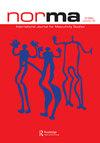家庭烹饪的男性化:瑞典男性食谱的历史研究
IF 2.1
Q2 SOCIOLOGY
引用次数: 1
摘要
摘要本研究分析了男性在1975年、1992年和2010年分别为男性撰写的烹饪书中如何表现和男性化男性的家庭烹饪。它脱离了国内男性气质的概念,采用了多模式批评话语分析的方法。它问道:什么样的价值观和思想与人、食物和家庭有关,是通过文本和图像实现的?这些是如何合法化和归化的?由于这项研究的背景是瑞典,一个以追求性别平等而闻名的国家,这项研究关注的是大约20年前出版的烹饪书中如何体现男性的家庭烹饪。分析表明,虽然前两本书的特点是“真正的男人”话语和工人阶级的男子气概,但2010年的书代表了一种符合与消费和物质性密切相关的“新男人形象”的男子气概。然而,在结构上几乎没有什么不同。与传统中产阶级男性气质、传统性别规范和家庭劳动性别划分相关的价值观被复制。男性烹饪被重新定义为一种有趣的休闲活动。在这三本书中,烹饪成为了一个男人表现成功的另一种方式——无论是在与其他男人和女人的关系上,还是在社会经济方面。本文章由计算机程序翻译,如有差异,请以英文原文为准。
The masculinization of domestic cooking: a historical study of Swedish cookbooks for men
ABSTRACT This study analyzes how men’s domestic cooking is represented and masculinized in cookbooks, written by men for men and published in 1975, 1992, and 2010, respectively. Departing from the concept of domestic masculinities, it uses the methods of Multimodal Critical Discourse Analysis. It asks: what kind of values and ideas connected to men, food, and the home are realized in texts and images? And how are these legitimized and naturalized? As the study’s context is Sweden, a country known for its pursuit of gender equality, the study focuses on how men’s domestic cooking has been represented in cookbooks published roughly 20 years apart. The analysis shows that, while the first two books are characterized by a ‘real man’ discourse and working-class masculinity, the 2010 book represents a masculinity in line with a ‘new man image’ closely linked to consumption and materiality. However, structurally, there are few differences. Values associated with traditional middle-class masculinities, traditional gender norms, and gendered division of domestic labor are reproduced. Men’s cooking is recontextualized as a playful leisure activity. In all three books, cooking becomes another way for a man to appear successful – both in relation to other men and women, and in socioeconomic terms.
求助全文
通过发布文献求助,成功后即可免费获取论文全文。
去求助
来源期刊

NORMA
Social Sciences-Gender Studies
CiteScore
3.00
自引率
14.30%
发文量
23
期刊介绍:
NORMA is an international journal for high quality research concerning masculinity in its many forms. This is an interdisciplinary journal concerning questions about the body, about social and textual practices, and about men and masculinities in social structures. We aim to advance theory and methods in this field. We hope to present new themes for critical studies of men and masculinities, and develop new approaches to ''intersections'' with race, sexuality, class and coloniality. We are eager to have conversations about the role of men and boys, and the place of masculinities, in achieving gender equality and social equality. The journal was begun in the Nordic region; we now strongly invite scholarly work from all parts of the world, as well as research about transnational relations and spaces. All submitted manuscripts are subject to initial appraisal by the Editors, and, if found suitable for further consideration, to peer review by independent, anonymous expert referees. All peer review is double blind and submission is online via Editorial Manager.
 求助内容:
求助内容: 应助结果提醒方式:
应助结果提醒方式:


